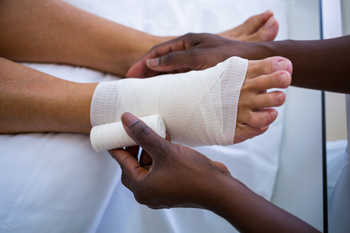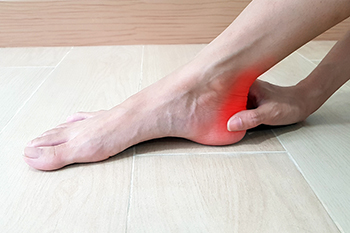Items filtered by date: March 2022
Itchy Feet at Night
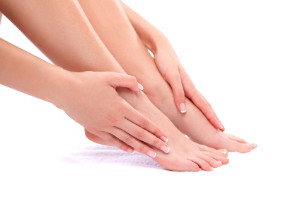 There are many people who experience itchy feet at night. They typically do not have foot issues during the day but may find their feet to be itchy when trying to go to sleep. There are several reasons why this may happen. The condition known as Athlete’s foot may contribute to itchiness at night. Additionally, dry skin may play a significant role and may be remedied by using a good moisturizer. Research has indicated that nerve damage caused by diabetes or liver disease may result in itchy feet at night. It may help to manage ongoing stressful conditions, which may even provide mild relief. If you endure itchy feet at night, or know someone who does, please schedule an appointment with a podiatrist who can determine the cause and provide various treatment options.
There are many people who experience itchy feet at night. They typically do not have foot issues during the day but may find their feet to be itchy when trying to go to sleep. There are several reasons why this may happen. The condition known as Athlete’s foot may contribute to itchiness at night. Additionally, dry skin may play a significant role and may be remedied by using a good moisturizer. Research has indicated that nerve damage caused by diabetes or liver disease may result in itchy feet at night. It may help to manage ongoing stressful conditions, which may even provide mild relief. If you endure itchy feet at night, or know someone who does, please schedule an appointment with a podiatrist who can determine the cause and provide various treatment options.
Foot Pain
Foot pain can be extremely painful and debilitating. If you have a foot pain, consult with the foot specialists from Podiatry Associates of Belleville. Our doctors will assess your condition and provide you with quality foot and ankle treatment.
Causes
Foot pain is a very broad condition that could be caused by one or more ailments. The most common include:
- Bunions
- Hammertoes
- Plantar Fasciitis
- Bone Spurs
- Corns
- Tarsal Tunnel Syndrome
- Ingrown Toenails
- Arthritis (such as Gout, Rheumatoid, and Osteoarthritis)
- Flat Feet
- Injury (from stress fractures, broken toe, foot, ankle, Achilles tendon ruptures, and sprains)
- And more
Diagnosis
To figure out the cause of foot pain, podiatrists utilize several different methods. This can range from simple visual inspections and sensation tests to X-rays and MRI scans. Prior medical history, family medical history, and any recent physical traumatic events will all be taken into consideration for a proper diagnosis.
Treatment
Treatment depends upon the cause of the foot pain. Whether it is resting, staying off the foot, or having surgery; podiatrists have a number of treatment options available for foot pain.
If you have any questions, please feel free to contact our office located in Belleville, NJ . We offer the newest diagnostic and treatment technologies for all your foot care needs.
The Importance of Caring for Foot Ulcers
Anyone can develop foot ulcers – but conditions such as neuropathy, poor circulation, foot deformities (like a bunion or hammertoe), or uncontrolled blood sugar, increase their likelihood. Foot ulcers are especially common among diabetics, and if left untreated can cause serious problems, even amputation of a foot or limb. The main culprit is a lack of feeling of pain, which leads to ignoring sores or wounds as they occur. Poor circulation lowers the body’s ability to heal properly, increasing the risk of foot ulcers developing. It is extremely important to keep the ulcer from becoming infected. Keep the area clean and bandaged, cleanse the wound daily, avoid walking barefoot, and monitor glucose levels. If the wound becomes infected, however, it is strongly suggested that you seek the regular care of a podiatrist who can examine the infected area and create an ongoing treatment plan. Such measures may include prescribing antibiotics, cleansing the wound, and even hospitalization, depending on the severity.
Wound care is an important part in dealing with diabetes. If you have diabetes and a foot wound or would like more information about wound care for diabetics, consult with the foot specialists from Podiatry Associates of Belleville. Our doctors will assess your condition and provide you with quality foot and ankle treatment.
What Is Wound Care?
Wound care is the practice of taking proper care of a wound. This can range from the smallest to the largest of wounds. While everyone can benefit from proper wound care, it is much more important for diabetics. Diabetics often suffer from poor blood circulation which causes wounds to heal much slower than they would in a non-diabetic.
What Is the Importance of Wound Care?
While it may not seem apparent with small ulcers on the foot, for diabetics, any size ulcer can become infected. Diabetics often also suffer from neuropathy, or nerve loss. This means they might not even feel when they have an ulcer on their foot. If the wound becomes severely infected, amputation may be necessary. Therefore, it is of the upmost importance to properly care for any and all foot wounds.
How to Care for Wounds
The best way to care for foot wounds is to prevent them. For diabetics, this means daily inspections of the feet for any signs of abnormalities or ulcers. It is also recommended to see a podiatrist several times a year for a foot inspection. If you do have an ulcer, run the wound under water to clear dirt from the wound; then apply antibiotic ointment to the wound and cover with a bandage. Bandages should be changed daily and keeping pressure off the wound is smart. It is advised to see a podiatrist, who can keep an eye on it.
If you have any questions, please feel free to contact our office located in Belleville, NJ . We offer the newest diagnostic and treatment technologies for all your foot care needs.
When the Back of Your Heel Is Painful
Pain behind the heel, known as posterior heel pain, can be caused by several conditions. Achilles’ tendonitis is an inflammation of the tendon that attaches to the back of the heel. The inflammation may be caused by tears or calcium deposits within the tendon. A bone spur that develops at the back of the heel bone (nicknamed “pump bump”) can irritate surrounding tissue and become painful rubbing against footwear. Retrocalcaneal bursitis is an inflammation of the cushioning bursa sac between the back of the heel and the Achilles tendon. Other possible causes of posterior heel pain include stress fractures in the heel bone, an inflammation of the plantar fascia tissue on the sole of the foot (plantar fasciitis), and compression and inflammation of a small, extra bone some people have in their ankle (os trigonum syndrome). If you have any pain in the back of your heel, it is suggested that you get your condition diagnosed and treated by a podiatrist.
Many people suffer from bouts of heel pain. For more information, contact the foot specialists of Podiatry Associates of Belleville. Our doctors can provide the care you need to keep you pain-free and on your feet.
Causes of Heel Pain
Heel pain is often associated with plantar fasciitis. The plantar fascia is a band of tissues that extends along the bottom of the foot. A rip or tear in this ligament can cause inflammation of the tissue.
Achilles tendonitis is another cause of heel pain. Inflammation of the Achilles tendon will cause pain from fractures and muscle tearing. Lack of flexibility is also another symptom.
Heel spurs are another cause of pain. When the tissues of the plantar fascia undergo a great deal of stress, it can lead to ligament separation from the heel bone, causing heel spurs.
Why Might Heel Pain Occur?
- Wearing ill-fitting shoes
- Wearing non-supportive shoes
- Weight change
- Excessive running
Treatments
Heel pain should be treated as soon as possible for immediate results. Keeping your feet in a stress-free environment will help. If you suffer from Achilles tendonitis or plantar fasciitis, applying ice will reduce the swelling. Stretching before an exercise like running will help the muscles. Using all these tips will help make heel pain a condition of the past.
If you have any questions please contact our office located in Belleville, NJ . We offer the newest diagnostic and treatment technologies for all your foot and ankle needs.
Can Cracked Heels Be Prevented?
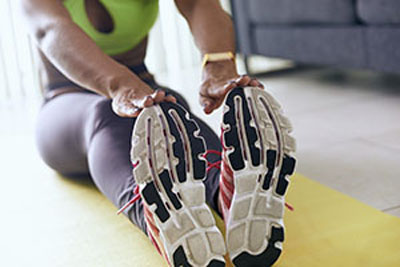 The foot condition known as cracked heels can develop for several reasons. These can include a vitamin deficiency, being overweight, and certain fungal conditions. Additionally, people who are diabetic may be more likely to experience cracked heels. This may be a result from a lack of circulation that can often accompany diabetes. Fissures, which are deep cracks in the skin, can cause significant pain and discomfort. Relief may be found when shoes that are worn have a closed back. Additionally, patients have found their skin may soften when a good moisturizer is applied, and it may help to avoid being barefoot. Drinking plenty of fresh water daily may help to reduce the risk of developing cracked heels. If you would like more information about how to prevent the onset of cracked heels, please confer with a podiatrist who can provide you with proper knowledge.
The foot condition known as cracked heels can develop for several reasons. These can include a vitamin deficiency, being overweight, and certain fungal conditions. Additionally, people who are diabetic may be more likely to experience cracked heels. This may be a result from a lack of circulation that can often accompany diabetes. Fissures, which are deep cracks in the skin, can cause significant pain and discomfort. Relief may be found when shoes that are worn have a closed back. Additionally, patients have found their skin may soften when a good moisturizer is applied, and it may help to avoid being barefoot. Drinking plenty of fresh water daily may help to reduce the risk of developing cracked heels. If you would like more information about how to prevent the onset of cracked heels, please confer with a podiatrist who can provide you with proper knowledge.
If the skin on your feet starts to crack, you may want to see a podiatrist to find treatment. If you have any concerns, contact the foot specialists from Podiatry Associates of Belleville. Our doctors can provide the care you need to keep you pain-free and on your feet.
Cracked Heels
It is important to moisturize your cracked heels in order to prevent pain, bleeding, and infection. The reason cracked heels form is because the skin on the foot is too dry to support the immense pressure placed on them. When the foot expands, the dry skin on the foot begins to split.
Ways to Help Heal Them
- Invest in a good foot cream
- Try Using Petroleum Jelly
- Ease up on Soaps
- Drink Plenty of Water
Ways to Prevent Cracked Heels
- Moisturize After Showering
- Skip a Shower
- Keep Shower Water Lukewarm
- Don’t Scrub Your Feet
If you are unsure how to proceed in treating cracked heels, seek guidance from a podiatrist. Your doctor will help you with any questions or information you may need.
If you have any questions, please feel free to contact our office located in Belleville, NJ . We offer the newest diagnostic and treatment technologies for all your foot care needs.
Reminder: When Was the Last Time...?
Ways to Care For the Feet as They Age
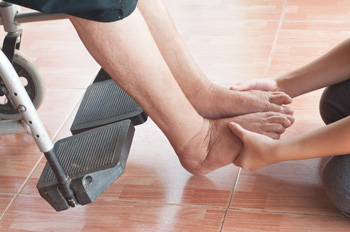 Over time, the feet begin to develop more problems due to everyday wear and tear. There is more stress placed on the joints in the feet, and the skin gets thinner and loses its elasticity. Because of the variety of debilitating foot issues that can occur with aging, it is important that elderly patients take care of their feet. Common issues that indicate aging feet include aches and pains, bunions, circulatory issues, and a curling up of the toes. Exercise, proper toenail trimming, moisturizing the feet, and wearing shoes that are supportive and that fit correctly are a few ways to minimize the effects of aging on the feet. Doing yearly checks with a podiatrist is another effective way to help care for the feet. A podiatrist can help detect a variety of issues that include diabetes and poor circulation, and they can help treat everyday foot problems like bunions and ingrown toenails.
Over time, the feet begin to develop more problems due to everyday wear and tear. There is more stress placed on the joints in the feet, and the skin gets thinner and loses its elasticity. Because of the variety of debilitating foot issues that can occur with aging, it is important that elderly patients take care of their feet. Common issues that indicate aging feet include aches and pains, bunions, circulatory issues, and a curling up of the toes. Exercise, proper toenail trimming, moisturizing the feet, and wearing shoes that are supportive and that fit correctly are a few ways to minimize the effects of aging on the feet. Doing yearly checks with a podiatrist is another effective way to help care for the feet. A podiatrist can help detect a variety of issues that include diabetes and poor circulation, and they can help treat everyday foot problems like bunions and ingrown toenails.
Proper foot care is something many older adults forget to consider. If you have any concerns about your feet and ankles, contact the foot specialists from Podiatry Associates of Belleville. Our doctors can provide the care you need to keep you pain-free and on your feet.
The Elderly and Their Feet
As we age we start to notice many changes in our body, but the elder population may not notice them right away. Medical conditions may prevent the elderly to take notice of their foot health right away. Poor vision is a lead contributor to not taking action for the elderly.
Common Conditions
- Neuropathy – can reduce feeling in the feet and can hide many life-threatening medical conditions.
- Reduced flexibility – prevents the ability of proper toenail trimming, and foot cleaning. If left untreated, it may lead to further medical issues.
- Foot sores – amongst the older population can be serious before they are discovered. Some of the problematic conditions they may face are:
- Gouging toenails affecting nearby toe
- Shoes that don’t fit properly
- Pressure sores
- Loss of circulation in legs & feet
- Edema & swelling of feet and ankles
Susceptible Infections
Diabetes and poor circulation can cause general loss of sensitivity over the years, turning a simple cut into a serious issue.
If you have any questions please feel free to contact our office located in Belleville, NJ . We offer the newest diagnostic and treatment technologies for all your foot and ankle needs.
